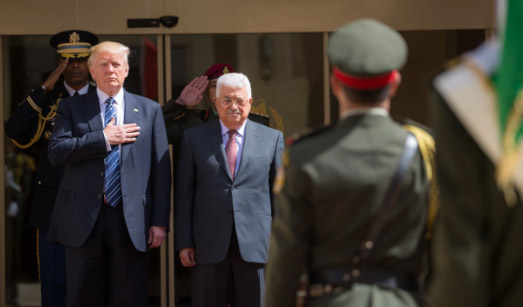After President Trump’s futile attempts to forge a deal between Israel and the Palestinian Authority, many in the Trump administration now appear to recognize that the PA is not really interested in peace at all. Although the diplomatic corps has been reluctant to walk away from its longstanding investment in the PA, the annual assessment of world terrorism released today by the State Department suggests that it, too, is finally coming around.
The secretary of state is required by law to provide Congress each year, by April 30, “a full and complete report on terrorism” from the previous year. The Country Reports on Terrorism, or CRT, as it is known, provides an annual glimpse into U.S. policy regarding nearly every nation on earth, some of which require only a paragraph or two while others go on for pages.
Israel, forever adjoined to the Palestinians, is described in one of the longer sections, titled “Israel, Golan Heights, West Bank, And Gaza.” During Barack Obama’s presidency, this section reflected a naïve trust in the PA and its president, Mahmoud Abbas, and a marked departure from the Bush-era’s skepticism about the PA’s ability to make peace.
This year’s CRT, the first of the Trump administration, was produced during a chaotic period, under two different Secretaries of State, following some very public resignations and a hiring freeze, and under the direction of a new boss of the Bureau of Counterterrorism (Nathan A. Sales). The report, released yesterday at noon, suggests a change is underway at the State Department.
Last year’s CRT was the last one of the Obama era. Parts of the Israel section read as though they were written by an advocate of sanctions against Israel. Particularly egregious was the conclusion that “Continued drivers of violence included a lack of hope in achieving Palestinian statehood, Israeli settlement construction in the West Bank, the perception that the Israeli government was changing the status quo on the Haram Al-Sharif/Temple Mount, and IDF tactics that the Palestinians considered overly aggressive.” When it came out, I wrote that “the only logical explanation for the State Department’s inaccurate and misleading report is that its authors still believe, as Barack Obama put it in a 2013 speech in Jerusalem, that Israel has ‘a true partner in President Abbas.’”
This year’s Israel section is much shorter (2267 words) than last year’s (3799 words), mostly because such uncritical praise for Abbas has been deleted. The 2016 CRT applauded Abbas for “his commitment to nonviolence, recognition of the State of Israel, and pursuit of an independent Palestinian state through peaceful means.” It somehow found that the “PA has taken significant steps during President Abbas’ tenure (2005 to date) to ensure that official institutions in the West Bank under its control do not create or disseminate content that incites violence.” It also laughably asserted that “Explicit calls for violence against Israelis, direct exhortations against Jews, and categorical denials by the PA of the possibility of peace with Israel are rare and the leadership does not generally tolerate it.”
Not one of these foolish and false claims appears in the 2017 CRT, except the line about how “Abbas maintained a public commitment to non-violence.” Maybe someone will correct that next year.
Last year’s CRT guilelessly explained that “the PA provided financial packages to Palestinian security prisoners released from Israeli prisons in an effort to reintegrate them into society and prevent recruitment by hostile political factions.” Not only has that passage been deleted, but in its place, this year’s CRT acknowledges that “The PA and PLO continued to provide ‘martyr payments’ to the families of Palestinian individuals killed carrying out a terrorist act.”
Unfortunately, the report fails to list important events from the year it analyzes. There is no mention of the “ Days of Rage” protests initiated by the PA in July 2017 after Israel installed cameras and metal detectors at the Temple Mount following the murder of two police officers there. Nor is there mention of the Fatah Central Committee’s call for Days of Rage in December 2017 to protest the U.S. embassy’s move to Jerusalem.
This year’s report also lacks the simple candor of earlier assessments, like the 2005 assertion that the PA’s “counterterrorism efforts fell far short of U.S. expectations” and the 2004 alert that “President Abbas’ public condemnation of terrorist acts was not matched by decisive security operations.”
The movement of the U.S. embassy to Jerusalem, the de-funding of the U.N. Relief and Works Agency for Palestine, and the closing of the PLO mission in Washington, D.C., all demonstrate an awareness that Abbas and his allies are unworthy of the trust they gained through the Oslo Accords. The 2017 Country Reports on Terrorism suggests that the State Department is finally reconsidering its failed investment in the Palestinian Authority.
A.J. Caschetta is a Ginsburg-Ingerman fellow at the Middle East Forum and a principal lecturer at the Rochester Institute of Technology.









